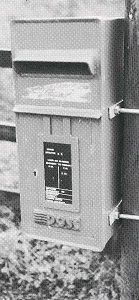GALWAY POSTBOXES

by Tom Kenny
The regular use of the words “post” and “Litir” in 15th century Irish manuscripts suggests that by that time, a postal system was already in existence here. In 1657, a Bill was passed ‘for settling the postage of England, Scotland and Ireland’ which set up a Government monopoly of the service. The Galway Post Office had been established in 1653, and the network of Post Offices throughout the county gradually grew.
With the rapid growth of correspondence following the introduction of uniform penny postage in 1840, a demand for more posting locations arose and the public began to request more roadside posting facilities. France had already successfully established a system of postboxes but there was a nervousness about installing them in Ireland as the public were unsure of their security.
The first record of a letter box erected in Galway was in March, 1858, when a wall box was sanctioned at Taylor’s Hill. This was probably the box with the VR cypher situated at “The Croft” which later had a replacement SE (Saorstát Éireann) door fitted in the 1920s after the original door was damaged. In June 1858, a wall box was sanctioned for erection at William Street and two years later an application for one at Flood Street was refused on the grounds that the site was “within a very short distance of two other receptacles for letters”.
In April, 1866, authority was given to substitute a large box for the small one at the Mainguard. This was the unique hexagonal box, named after its designer J.W. Penfold. Very few of these were made. This one, an elegant piece of street furniture, was in use until a few years ago when some idiot reversed into it and it was removed. Complaints about letters being caught up and delayed by faults in the internal construction of these hexagonal boxes (though this one at the High St./Mainguard St. junction always worked perfectly) resulted in a reversion to cylindrical boxes.
A report in The Galway Vindicator of the 17th of August, 1872, stated that collections would be made from boxes at Rockbarton, Salthill, Nile Lodge, Mainguard Street and Eyre Square. Surprisingly it was not until years later that it was realised that these boxes did not bear the royal cipher or indeed any indication that they were Post Office property.
Most of the early boxes were painted dark green but then in 1874, they started to colour them red in London. The box at the Jesuit Church with an Edward VII cypher was erected between 1901 and 1910. The box at Courthouse Square, with a George V cypher was erected after 1910. In all, there were 16 pillar boxes in Galway. The one at University Road was an ‘A’ type, the largest of wall boxes. There was an Edward VII wall box at Seamount, Salthill that had the door replaced with an SE cypher on it, and there were occasional lamp boxes clamped to poles. These were smaller than the usual ones.
Sadly, these very functional pieces of street furniture have all but disappeared, but today we can show you illustrations of some of them.
 1. The wall letter box at Taylor’s Hill erected in 1858, possibly the first box erected in Galway.
1. The wall letter box at Taylor’s Hill erected in 1858, possibly the first box erected in Galway.
 2. The Penfold box at the corner of High Street and Mainguard Street
2. The Penfold box at the corner of High Street and Mainguard Street

3. The Pillar Box, the 1879 design with a high aperture and no cypher or markings.

4. The Pillar Box at St. Augustine St., the 1884 design with the lower aperture and without cypher. It was erected at the corner of Dock Road on December 5th, 1887.

5. A later wall box with a P & T cypher.
 6. A more modern box with the Post logo.
6. A more modern box with the Post logo.
All of the above, including the illustrations came from a wonderful article by the late Jimmy O’Connor which appeared in the Galway Archeological and Historical Society Journal Volume 44, 1992. The title was “Aspects of Galway Postal History, 1638 – 1984”. A remarkable article in a remarkable journal.
